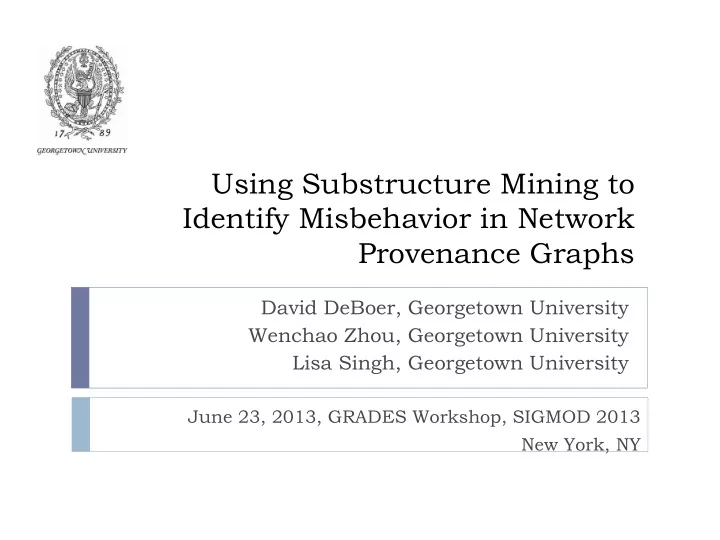

Using Substructure Mining to Identify Misbehavior in Network Provenance Graphs David DeBoer, Georgetown University Wenchao Zhou, Georgetown University Lisa Singh, Georgetown University June 23, 2013, GRADES Workshop, SIGMOD 2013 New York, NY
Distributed Systems Distributed systems have seen huge success They touch many parts of our daily lives Faults are costly Monitoring and maintenance is difficult Network Provenance is a proposed solution F E A D I J G B C H
Our Contribution Leverage the dependency graph of network provenance for a substructure mining application Find common execution patterns Use them as a feature set to identify misbehaving nodes Use heuristics to find substructures more quickly Implement with a graph database, neo4j Perform extensive evaluation F E A D I J G B C H
Proposed System Architecture Sub- structure Search
Example: Network Provenance A B C F E A D I J G B C H
Example: Provenance Graph
Example: Provenance Graph
Example: Provenance Graph
Example: Provenance Graph
Example: Provenance Graph
Example: Provenance Graph
Example: Provenance Graph One Hop Path
Example: Provenance Graph Multi Hop Path
Example: Provenance Graph
Example: Provenance Graph
Example: Provenance Graph One Hop Path
Example: Provenance Graph Multi Hop Path
Example: Provenance Graph
Example: Provenance Graph
Example: Provenance Graph One Hop Path
Example: Provenance Graph No Multi Hop Path
Proposed System Architecture Sub- structure Search
Substructure Mining Substructure mining is the search for “good” subgraphs within a graph or set of graphs Two parts: Searching the space of possible substructures Finding instances of an individual substructure
Substructure Mining: Substructures Many Possible Graph substructures C A A B C B C C A
Substructure Mining: Instances Graph Substructure C A A C A A B C B C B C C A
Subdue Classical substructure mining algorithm (N.S.Ketkar et al., 2005) Substructures are evaluated based on how well they compress the full graph Compression calculated based on non-overlapping instances Subdue uses a guided beam search to search the space of possible substructures Structures from a previous iteration are expanded, tested, and only the best of the expanded go on to the next iteration (beam size = number of the best substructures)
Substructure Mining: Subdue Graph Substructure C A A C AC A A B C AC ABC ABC B C B C AC C A
Substructure Mining: Subdue Compressed Graph 1 Compressed Graph 2 C AC AC B ABC ABC B AC C A C
Proposed System Architecture Sub- structure Search
Heuristics Limiting the number of substructures to search Duplicate Substructure Reduction Outward Expansion Speeding up the search for substructure instances Infrequent Start Vertex Start Vertex Reuse
Duplicate Substructure Reduction During the expansion of substructures you duplicate substructures are created and tested. We incorporated aspects of Gspan (Yan and Han, 2003) to help reduce the number of duplicates link link Expands T o link Or r2 r2 r2 r2 r2 r2 r3 r3
Outward Expansion When determining new substructures to search for, only expand using outgoing edges A possible problem is that certain types of substructures will be ignored. link r3 link link Expands T o r2 r2 r2 r2 r2 r2 Not r2 r3 r3 r3
Infrequent Start Vertex Testing a substructure instance starts with a single vertex Pick start vertices based on the least frequently occurring vertex type in the substructure B A A B A B B B B B
Start Vertex Reuse Good substructures get expanded to new substructures Save the subset of start vertices which have a match New substructures can take advantage of the information from the previous substructure B A A B A B B B B B
Experimental Setup Use 5 different inferred intra-domain topologies from the Rocketfuel project (Spring et al., 2002) Dataset ASN Nodes Links |V(G)| |E(G)| 1 1221 108 306 16,227 28,090 2 1755 87 322 23,015 40,725 3 3257 161 656 52,848 94,568 4 6461 141 748 73,316 134,072 5 1239 315 1,944 317,066 592,038 Use a beam size of 10 with 100 expansions maximum Evaluate run time, quality of substructures, and effect of beam size
Experimental Runs DB-OPTIMIZED: all heuristics using Neo4j MEM-OPTIMIZED: all heuristics using in memory version No-DUP-REDUCE: all heuristics except duplication reduction No-EXPAND-OUT: all heuristics except outward expansion No-REUSE: all heuristics except reuse of start vertices BASE-LINE: no heuristics
Results (Run Time) Each heuristic improves the run time DB version consistently outperforms the memory version
Results (Compression) Top compression results the same for each run
Conclusion Contributions Apply substructure mining to network provenance Implement algorithm using the neo4j graph database Propose heuristics which take advantage of provenance structure Perform extensive evaluation that shows strength of our approach Future Work Try other protocols Use more advanced substructure mining techniques Take advantage of the tree like structure of our graphs Explore substructure mining for dynamic provenance graphs Implement a complete system to test using misbehaving nodes
References N.S. Ketkar, L.B. Holder, and D.J. Cook. Subdue: compression-based frequent pattern discovery in graph data. In Proc. OSDM , 2005. N. Spring, R. Mahajan, and D. Wetherall. Measuring isp topologies with rocketfuel. ACM SIGCOMM CCR , 32(4), 2002. X. Yan and J. Han. Closegraph: mining closed frequent graph patterns. In Proc. SIGKDD , 2003. W. Zhou, M. Sherr, T. Tao, X. Li, B. T. Loo, and Y. Mao. Efficient querying and maintenance of network provenance at Internet-scale. In Proc. SIGMOD, 2010.
Recommend
More recommend